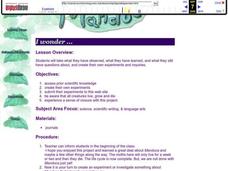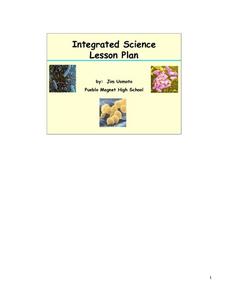It's About Time
Oil and Gas Production
Would you consider a power failure a current event? This lesson uses multiple experiments, guided inquiry activities, and group discussions to cover the topics of oil and gas production. This is the seventh lesson in a series of eight.
Space Awareness
What is Time?
Does it ever seem like time is slipping through your fingers? Model the passing of time with an hourglass activity in which individuals determine whether hourglasses are the most efficient way to measure time.
Curated OER
DNA Detectives
In order to understand DNA fingerprinting, advanced biology aces divise a crime scenario and analyze three different samples of lambda DNA. This creative lesson plan provides practice with micropipettes, electrophoresis boxes, and other...
Pyro Innovations
Beach Exploration
Little ones will absolutely love this instructional activity. It's all about the beach and what they can find while sifting through the sand. A large bucket of sand filled with hidden items is brought into the classroom. Learners will...
Curated OER
Mixed Up Chameleon
Students discover facts about chameleons. In this adaptations lesson plan, students read a book about chameleons and discuss the adaptations they have to survive. Students also discuss predator and prey of the chameleon. Students make...
Curated OER
Hamlet Research Paper: Find, Evaluate, and Select Appropriate Research Sources
Help young researchers find credible sources online. Modeling with a Google search for information about Shakespeare’s Macbeth, use a computer projector or Smart Board to show class members how weak the top three search results are....
Lerner Publishing
Teaching Habitats
What makes up a habitat? Use this resource to engage first graders in the exploration of desert, wetland, forest, and ocean habitats. Youngsters classify plants and animals into the four distinct habitats through drawings and cutting and...
It's About Time
Exploring Energy Resource Concepts
Please turn off the lights to conserve energy. Or not, after all energy is always conserved. This first lesson in an eight-part series includes three parts. Part A contains one hands-on activity and two inquiry-based experiments on heat...
Odyssey of the Mind
Odyssey of the Mind Curriculum Activity: From a Distance
Challenge your class with an amazing set of ideas that really put the project back into project-based learning. It all starts with a whole class research task. Each learner will look up and take notes on multiple facets of things that...
Mascil Project
Circular Pave-Stones Backyard
Pack the lesson into your plans. Young mathematicians learn about packing and optimization with the context of circular paving stones. They use coins to model the paving stones, and then apply knowledge of circles and polygons to...
Curated OER
Dry Ice: Simply Sublime
A fascinating lesson on states of matter is here for your young scientists. Dry ice is used to challenge learners preconceived notions about how solids work. They discover all sorts of interesting facts about states of matter from...
Curated OER
Pollination of Flowers by Moths
Turn your classroom into a pollination station as your kids transform into moths or predators trying to survive and aiding in plant reproduction along the way. Using silent party blowers as proboscises, the moths will have two minutes to...
Chemistry Collective
Virtual Lab: DNA Binding Problem
Why do the bases in DNA pair up the way they do? Unravel the mystery of the double helix in a virtual lab. Young scientists follow in the footsteps of Watson and Crick to determine the free energy associated with DNA base pair binding....
American Chemical Society
Diapers: The Inside Story
There shouldn't be any accidents with this activity! An inquiry-based lesson has learners explore the absorption properties of the gel compound in diapers. After testing its properties, they learn the science of the molecules that make...
Field Museum
The Case of Darwin's Finches
One of the most striking pieces of evidence for Darwin's Evolution of Species was his observations of finches and how their beaks differed from island to island, depending on their primary food sources. So what would happen to the theory...
Curated OER
I Wonder...
Pupils review information they have gathered from previous lessons. They create their own experiments and carry them out. They reflect on the project as a whole.
Curated OER
Grass as Biomass
Students explore energy properties by listening to a sustainability lecture in class. In this biomass activity, students identify what biomass is, how it can be transformed into a usable energy and how it complements the energy cycle....
Curated OER
The Great Kapok Tree by Lynne Cherry
With The Great Kapok Tree, by Lynne Cherry as the hook learners discuss the rainforest, the animals that live there, and conservation efforts. Then, students write a letter to the man in the story asking him not to cut down the Kapok...
Curated OER
I Wonder What Would Happen if Lots of Manduca Lived in a Small Place...
Students discuss the reasons why humans fight and look for similiarties in animals. They make predictions on what they think will happen when they observe insect crowding. They make conclusions about their predictions to end the lesson...
Curated OER
Galileo's Dialogue
Explore how Galileo's controversial theory raised objections in his time. In this physical science activity, learners research about current controversial issues. They role play both sides of the issue, and decide which one has a...
Curated OER
Science is a Wonderland
Students use the scientific method to study Animalia and Plantae Kingdoms. In this science inquiry lesson, students watch a PowerPoint about science process skills. Students complete the National Geographic bottled Eggs-periment or the...
Curated OER
Documenting Science Through an Active Inquiry Process
Students follow procedures regarding scientific data collection. In this scientific inquiry lesson, students investigate inquiry questions through research and data collection. Students use technology tools to create products that...
Curated OER
Scientific Method Unit: Bacteria
Young scholars discover how to apply the steps of the inquiry process through the study of bacteria. Working in groups of four, they cooperatively read an article about bacteria and complete a graphic organizer. Group members share with...
Curated OER
Science Simulation: BBC Science Simulations 3
Students perform experiments on a Promethean Board and will identify and use stages of the inquiry process. Students will be in instructed in the use of a Promethean board, will practice and eventually perform experiment on their own.

























